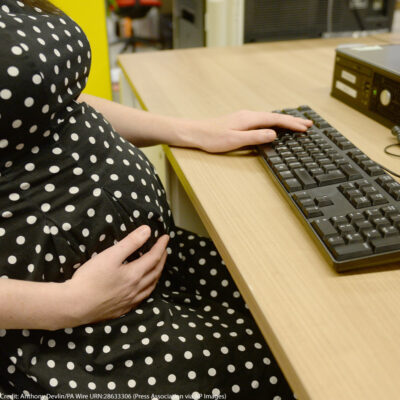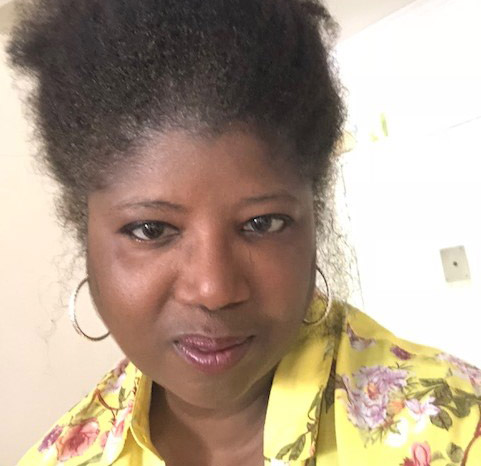
The Decade-Long Fight for Pregnant Workers
July 20, 2023
On Tuesday, June 27, more than a decade after its first introduction in a congressional committee, the Pregnant Workers Fairness Act went into effect, changing the landscape of work for all pregnant people. Before this law, many pregnant workers had to decide between protecting their jobs and protecting their health.
While there have been efforts in the past to protect pregnant workers, employers have always found loopholes to avoid providing accommodations. Against their judgment and against their doctors’ judgment, pregnant workers have had to lift heavy objects, stand for hours on end, and expose themselves to hazardous chemicals. This will no longer be the case thanks to national advocacy efforts, including those from us here at the ACLU.
Today, we’re speaking with Vania Leveille, senior legislative counsel in the ACLU’s National Political Advocacy Department, who will share more about the mammoth undertaking that moved the law to its passage, and Gillian Thomas, senior staff attorney for the ACLU’s Women’s Rights Project, who will detail what the act looks like in practice.
In this episode
Kendall Ciesemier

Listen to this episode on
Apple Podcasts SpotifyThis Episode Covers the Following Issues
Related Content
-
Press ReleaseFeb 2026

Disability Rights
Repeal Of County Ordinance, After Federal Court Injunction, Allows Harm Reduction Programs In Lewis County To Resume. Explore Press Release.Repeal of County Ordinance, After Federal Court Injunction, Allows Harm Reduction Programs in Lewis County to Resume
SEATTLE – Attorneys for Gather Church today announced that Lewis County has repealed a local ordinance that prevented the church, a ministry devoted to helping people with substance use disorder, from providing critical, lifesaving harm reduction services through its syringe services program. The repeal is the result of a settlement agreement reached after the U.S. District Court for the Western District of Washington on Dec. 31 blocked enforcement of the ordinance, finding that the ordinance likely violates the Americans with Disabilities Act, the Rehabilitation Act, and state laws that permit and encourage harm reduction services. Gather Church is represented by American Civil Liberties Union, the ACLU of Washington (ACLU-WA), and law firm Kaplan & Grady. The settlement agreement reached by the parties includes a total repeal of the ordinance, which Lewis County has done today. Now that the ordinance is repealed, Gather Church can resume its mobile syringe services program and distribute lifesaving supplies like test kits for fentanyl and xylazine, and the federal court case against Lewis County will be dismissed. The settlement also includes $500,000 in attorney's fees. “The harm reduction program at Gather Church is effective, and it saves lives. We are thrilled that our mobile clinic and distribution program can resume. Serving the community is a core part of Gather’s religious mission, and we won’t stop meeting people where they are,” said Cole Meckle, pastor at Gather Church. Harm reduction services use non-judgmental strategies to minimize the negative health, social, and legal consequences associated with substance use. In 2019, Gather opened a mobile SSP that offered sterile syringes to people who would otherwise share unsterile syringes, along with other vital health services such as nursing assessments, mental health assessments, wound care, and connection to treatment and medical services, to name a few. The program is supported by a grant from the Washington State Department of Health and built on decades of research showing that SSPs save lives, reduce the transmission of disease, facilitate access to drug rehabilitation, and do not increase drug use or local crime. “The total repeal of this discriminatory ordinance is a victory not only for the recipients of harm reduction services, but for the community writ large. Harm reduction benefits everyone by reducing disease transmissions and overdoses, and it should be encouraged—not banned,” said Malhar Shah, staff attorney with the ACLU Disability Rights Program. “Pastor Cole and Gather offer care and compassion to people who Lewis County would otherwise turn its back on. This settlement is a victory for harm reduction providers and others who insist on uplifting our shared humanity,” said Tara Urs, staff attorney with ACLU-WA. “By halting Lewis County’s discriminatory ordinance, the court recognized the civil rights of faith-based and secular harm-reduction providers who deliver life-saving health care and dignity to people all too often marginalized by their communities ,” said David Howard Sinkman of Kaplan & Grady.Court Case: Gather Church v. Lewis CountyAffiliate: Washington -
Press ReleaseDec 2025

Disability Rights
Women's Rights
Civil Rights Groups Urge Appeals Court To Order Timely Benefits Review For Survivors Of Military Sexual Trauma. Explore Press Release.Civil Rights Groups Urge Appeals Court to Order Timely Benefits Review for Survivors of Military Sexual Trauma
WASHINGTON – Four organizations advocating for the civil rights of survivors of military sexual trauma (MST) filed a friend-of-the-court brief today urging the U.S. Court of Appeals for the Federal Circuit to reverse a lower court decision denying expedited adjudication of veterans’ benefits to people with mental health disabilities arising from sexual violence in the military. The organizations filing the amicus brief, the National Alliance to End Sexual Violence, Protect Our Defenders Foundation, Service Women’s Action Network (SWAN), and the Victim Rights Law Center, are represented by the American Civil Liberties Union. “Survivors of military sexual trauma have already endured profound harm in service to our country, it is an insult upon injury that they are being forced to endure years of bureaucratic delay to receive the benefits Congress expressly promised them,” said Josh Connolly, senior vice president of Protect Our Defenders Foundation. “Congress was unequivocal when it passed the Dignity for MST Survivors Act: claims involving military sexual trauma must be expedited. Ignoring that mandate not only defies the law, it retraumatizes survivors and further undermines trust in the system meant to protect them.” In December 2022, Congress passed legislation requiring the Department of Veterans Affairs (VA) to improve its treatment of MST survivors, including the Dignity for MST Survivors Act which mandates the VA to expedite administrative appeals involving MST. Yet the U.S. Court of Appeals for Veterans Claims ruled in a case brought by Karissa Wiggins that it would not enforce this duty. “Survivors of military sexual trauma experienced the violence while in service to our country,” said Stacy Malone, executive director of Victim Rights Law Center. “It is unconscionable that victims are being denied timely access to benefits that would help them heal and rebuild their lives.” The brief explains that timely access to benefits is critical for veterans with disabilities stemming from MST, affording survivors who require costly treatment or are unable to work the financial support they need. It also explains that expedited adjudication and appeals encourage survivors to report MST and is consistent with Congress’ intent to make compensation for survivors more readily available. “Congress passed the Dignity for MST Survivors Act nearly unanimously with a crystal-clear mandate: to improve the treatment of victims of military sexual trauma. By denying prompt review of these claims, our government is breaking the promise Congress made to care for those who have served,” said Brad Adams, senior staff attorney with the ACLU Disability Rights Program. Finally, the brief highlights that women and LGBTQ veterans are overrepresented among survivors, bearing the brunt of a dysfunctional claims process, while stigma and implicit biases infect the claims of men and Black veterans, who are more likely to have their claims denied. “Timely access to benefits can be the difference between stability and crisis for survivors of military sexual trauma. Congress recognized this reality when it required expedited review of MST claims. Failing to enforce that law undermines both survivor dignity and congressional intent,” said SWAN’s CEO and President Elisa Cardnell. The brief is available here: https://www.aclu.org/cases/karissa-wiggins-v-douglas-collins?document=Amicus-BriefCourt Case: Karissa Wiggins v. Douglas Collins -
Court CaseDec 2025

Disability Rights
Women's Rights
Karissa Wiggins V. Douglas Collins. Explore Case.Karissa Wiggins v. Douglas Collins
-
Press ReleaseNov 2025

Racial Justice
Disability Rights
Aclu Comment On Department Of Education’s Dismantling Of Core Civil Rights And Education Offices. Explore Press Release.ACLU Comment on Department of Education’s Dismantling of Core Civil Rights and Education Offices
WASHINGTON – Today, the U.S. Department of Education announced that it will transfer critical work to other federal agencies — an unprecedented move that undermines the department’s core mission and threatens students’ civil rights. This action represents a deliberate attempt to dismantle the agency from within, despite the fact that only Congress has authority over the department. “The Trump administration claims core education programs can be carried out elsewhere, yet it has offered no explanation for how agencies like Labor, Interior, Health and Human Services, or State will uphold the education access requirements Congress explicitly entrusted to the Department of Education,” said ReNika Moore, director, ACLU Racial Justice Program. “Federal law requires these programs to remain within the Department of Education, and transferring them through interagency agreements violates that mandate.” These offices, staffed by career professionals with deep knowledge of how to best serve students and educators, are responsible for administering K-12 and higher education programs, supporting Native students, and safeguarding the rights of students with disabilities. Although the plan calls for Labor to administer K-12 programs that are “better aligned with workforce and college programs,” it is silent concerning the continued administration of congressionally mandated funding programs for school districts to develop high quality curriculum, provide accommodations and services for children with disabilities, help children meet state academic content and performance standards, provide before- and after-school programs, reduce class sizes, improve graduation rates, expand the availability of pre-schools, provide mental health supports, implement language instruction to assist English learners, and provide education to migratory students. The removal of these critical offices from the department guts the structure Congress established in 1979 to guarantee that students, regardless of race, national origin, sex, or disability, receive fair and equitable opportunities to learn. “Secretary McMahon is violating laws that only Congress can change. By transferring these offices across agencies that lack the expertise to lead education policy, the administration is breaking the law, eliminating academic supports to close education achievement gaps, deliberately weakening civil rights oversight, and putting millions of students at risk,” said Kimberly Conway, ACLU senior policy counsel and former attorney advisor with Department of Education’s Office for Civil Rights. “Congress must immediately intervene to halt this unlawful restructuring, safeguard the integrity of the department’s civil rights and education offices, and demand that the department comply with the law and keep its central role in ensuring equal educational opportunity for every student.

